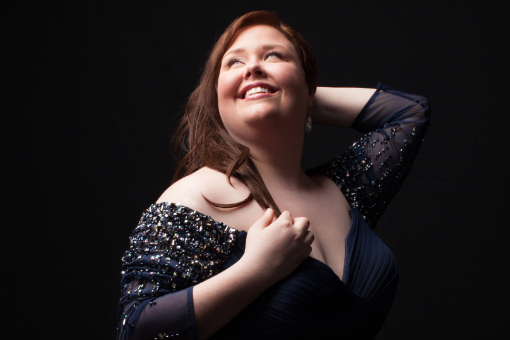Barton wraps Kennedy Center’s vocal series in grand (and intimate) style

Jamie Barton performed Saturday night at the Kennedy Center. Photo: Fay Fox
The Kennedy Center established Renée Fleming’s vocal recital series, imaginatively titled “Voices,” in 2016, as part of the venue’s embrace of Broadway, jazz, folk, and other popular music genres. Every once in a while, the series presents an opera singer as it did with mezzo-soprano Jamie Barton Saturday night in the Kennedy Center Family Theater.
Barton described this program, created with pianist Kathleen Kelly, as “a celebration of women.” Half of the composers were women, some of the poets were women, and many of the songs were sung from the vantage point of women. Illness had forced Barton to postpone this recital back in March, traditionally celebrated as Women’s History Month.
In four opening songs, Barton bathed in lush, late romantic harmonies, and Kelly wielded a full sound at the keyboard in support of the singer’s broad, plentiful voice. The patterns of arpeggios in the accompaniment of Elinor Remick Warren’s “Heather” rolled like the Scottish fields depicted longingly in Marguerite Wilkinson’s poem. Barton initiated phrases with a cushioned, soft attack, spinning them out in velvety legato.
Barton’s French diction, tinged by a slight American accent, was fairly good in Lili Boulanger’s “Attente,” set to an oneiric poem by Maurice Maeterlinck. The melody floated over Boulanger’s undulating harmony, with Barton’s powerful forte sound booming in an impressive crescendo at the song’s midpoint.
In this sequence of slow, harmonically rich songs, Amy Beach’s “Ah, Love, but a day,” was perhaps one too many. Barton’s potent chest voice and top notes commanded the loud climax of this piece. Nadia Boulanger’s more austere “S’il arrive jamais” provided some needed variety with its odd, darker harmony. The music of the older Boulanger sister, once a teacher of Elinor Remick Warren’s in Paris, brought this set full circle.
Surprises came in Haydn’s dramatic solo cantata Arianna a Naxos, where Barton produced a silky pianissimo sound relatively free of vibrato. Kelly mirrored her soloist with an equally subtle touch at the piano, which helped the duo create a wide range of dynamics and dramatic shading in the lengthy recitative sections. Early music is not something one would associate with this ample a dramatic voice, but Barton’s control and finesse could change one’s mind. Not least, Barton’s interpolated high notes, the last one perhaps excessively so, shook the rafters.
In Libby Larsen’s Love After 1950, a set of five songs with overtones of American popular music, Barton allowed her Georgia drawl to come out and play. Setting poems by Rita Dove and others, Larsen infused each song with more or less overt allusions to blues, honky-tonk, and so forth. Barton embraced this popular idiom too openly at times, straightening out her tone in ways that affected her intonation. “Big sister says, 1967” got the biggest laughs, largely because of Kathryn Daniel’s words about how “looking good hurts,” matched by hammered chords and glissandi in the piano.
Maurice Ravel’s broad “Chanson à boire,” from Don Quichotte à Dulcinée, gave Barton a chance to flex the basement range of her low end. While she overdid this song’s tipsiness, Barton was back to refined restraint in Henri Duparc’s quiet, worshipful “Phidylé,” matched by Kelly’s transparent playing, growing to a soaring forte at the end. The recital came to a resonant conclusion in Richard Strauss’s “Cäcilie,” in the style for which Barton’s type of voice is best suited.
Barton offered the audience an opportunity to choose between two encores by level of applause. The exercise was rendered moot in the end, as she sang both of them: Zina Goldrich’s hammy eye-roller “The Alto’s Lament” and, from Cilea’s Adriana Lecouvreur, the arresting aria “Acerba voluttà.”
Note to presenter: Someone at the Kennedy Center should realize that if you are going to print foreign texts and translations in the program, it would be a good idea to provide some light in the house to read them by during the performance.



Posted May 05, 2019 at 1:04 pm by Milton Grossman
“Amen” to your last paragraph. The darkness was very frustrating.